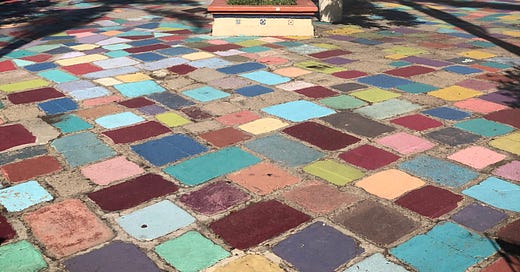I’ve tried to find spirituality in a lot of places. Circa 2016 and beyond, my years have been characterized by exploration and experimentation with handfuls of practices and belief systems, ideas and theories. What I’ve noticed in many of these places—so-called ‘spiritual’ or not—is that they are often focused on transcending the human state and becoming more god-like. They perpetuate the notion that you are enough as you are and have the capacity to be love and light, if you will.
But the idea that you are all you need to rely on and you can indeed become a state of want-for-nothing love and light is not as spiritual as it seems, I’ve been thinking. As the great author and Lutheran minister
said recently in this podcast, “you aren’t enough and that’s ok. There is enough, but it doesn’t have to be you.” She goes on to say how this limitation of our humanity can remind us that we can draw upon what we don’t have from source, or God, or whatever else we choose to have faith in. We can use prayer, meditation, or the like to call upon what we need, and to humble ourselves before what is greater.“There is enough but it doesn’t have to be you.”
What I hear from what Nadia says is that it’s ok to not feel like we have or are enough. The lie of pretending that we do feel worthy and whole when we don’t will generate more self-hatred and deficit. Forgiveness, compassion, guidance, support, or whatever else it is we are looking for cannot always come from within. We don’t have to rely on our faulty, flawed human selves to get through all of life: we are here in community, and we are here united by something divine.
Trying to be what we are not and have what we don’t have may be where the tendencies to be self-destructive and act out of deficiency stem from. Maybe accepting our limitations as humans, and resourcing what we don’t have from others, or divinity, will help us reach more of a place of (relative) inner peace.
I’ve heard it said that you can hold perfection as the goal to aspire toward, without necessarily believing you’re going to actualize it, because perfection is impossible. I guess that some people have the capacity to practice this in a way that remains empowering—Godspeed to them. That kind of thinking sends me spiraling into neuroses.
I don’t think enlightenment is my row to hoe in this lifetime; I don’t think that perfection or what New Age spirituality has dubbed the higher self is actually that worthy of striving toward. I’m not sure there is a higher self to evolve into: I think there’s just a little part of you that’s connected to source, or what my friend Jackson calls the divine kernel within you. The idea of having a higher self is only really useful to me if I can recognize that it isn’t me; it’s something I can draw upon for wisdom and guidance.
. . .
I am decreasingly captivated by the idea that I can be certain of or free from anything. But what I know about spirituality is that there is a source to have faith in—I don’t usually call it god, or sometimes anything, and I don’t know that it makes a difference, honestly. As Glennon Doyle once said, “it doesn’t matter what you call god, it matters that you call it,” and that’s pretty good.
Whoever you are now is simply to be accepted as what is true—you don’t need to pretend to be good or enough. You aren’t going to get rid of your faults or stop making mistakes. You’re allowed to be embarrassing and dramatic and chaotic and jealous and hopelessly hopeful; to get lost in the confusing turbulence of being alive. Recognizing that your deficiencies are what make you human may just allow you to stop operating solely from this deficient place. You may not ever feel enough on your own (and if you are, maybe question that), but perhaps you can be content with who you are, now, in all your fucked-up glory.
May you remember that there is enough to go around this week, but that it doesn’t all have to come from you. Practice calling on that divine kernel, maybe. Or at least call your friends.
Maggie



